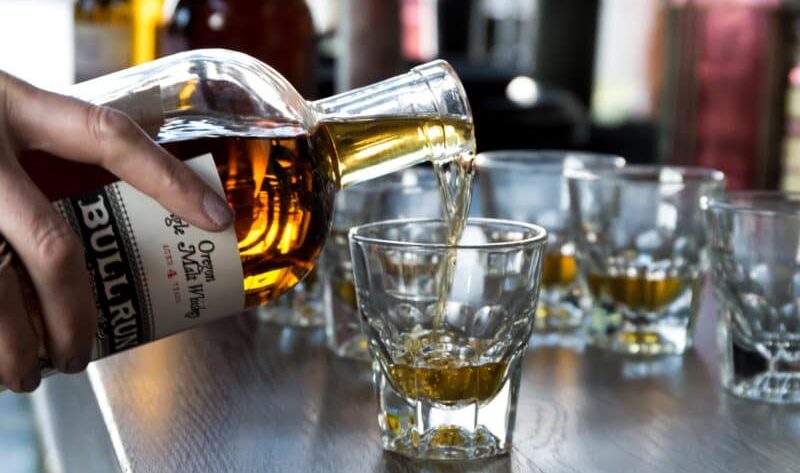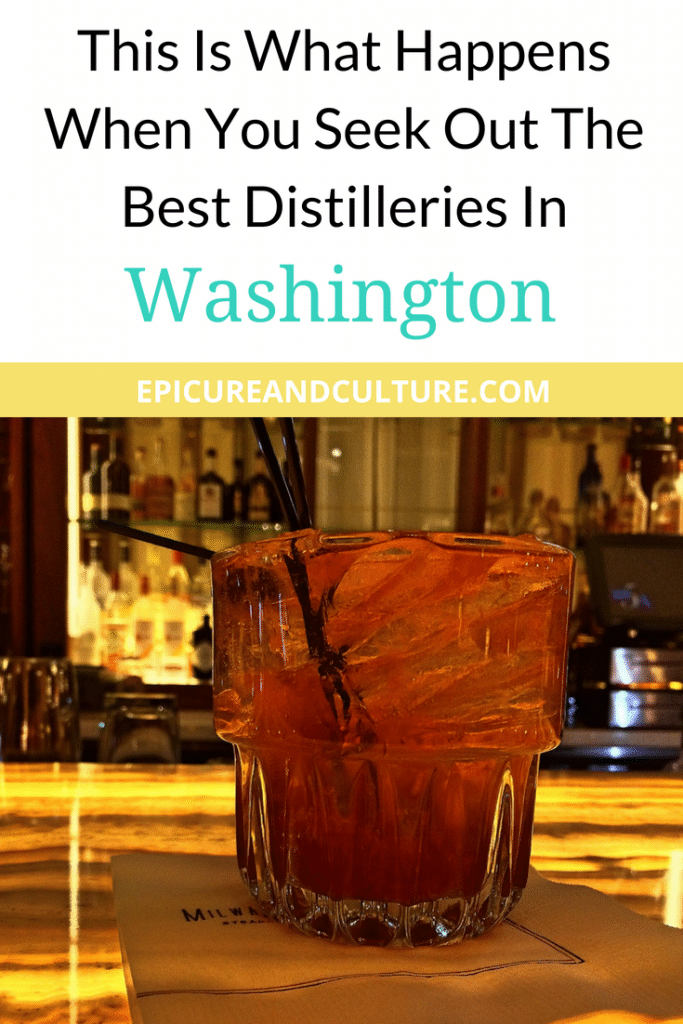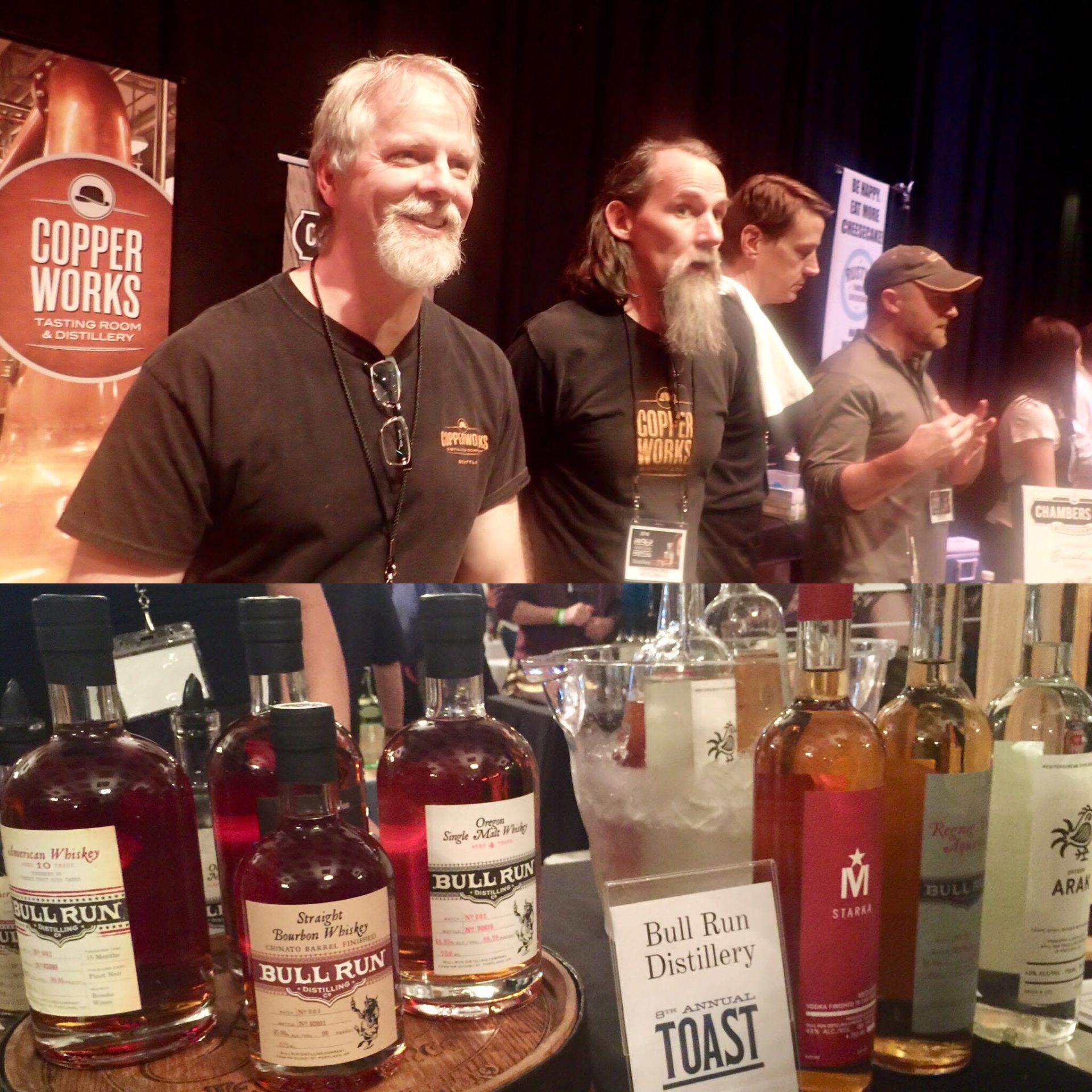By Becky Garrison, Epicure & Culture Contributor
Would you say no to one of the key players credited for bringing craft brewing to the United States?
No, neither would I.
A few years back, I found myself on a quest to explore local craft beverages — specifically quality distilleries in Washington.
While at Pike Brewing Company, I met with beer legend Charles Finkel, who suggested I connect with Jason Parker. Parker is the co-founder of Copperworks Distilling Company — and was the first brewer for Pike when it opened in 1989.
Of course, I listened.
And here’s why I’m glad I did:
At the time, Copperworks was offering tastings of their craft gin and vodka, with their whiskey still maturing in charred new American Oak barrels.
The distillery and tasting room’s creamy wooden and copper interior felt like an oasis for me from the touristy traffic that waddled along the downtown Seattle waterfront.
Psst! Don’t forget to pin this post for later!
Distilleries In Washington Worth The Trip
Thus began one of my favorite rituals:
Whenever I visit Seattle, I always stop by Pike’s Pub, followed by a quick jaunt to Copperworks. Their gin and vodka has a crisp clean taste that blends well with cocktails or savored straight.
But for so long, the Scotch aficionado in me longed for the day their whiskey would be ready for sipping.
So I waited.
And waited.
And waited.
For those who have never had Scotch, here is why I continued to wait for Copperworks innagural release of their Single Malt Whiskey:
I first tasted Single Malt Scotch Whiskey in the 1990s during my foray into fly fishing, cigars and distilled beverages.
The carmel brown hue gave off a softened glow that would relax my eyes after an intense day on the water.
Then I would soak in the rich nose that varied from a peaty oak to a more crip pine, depending on the barrelling process.
Next, my mouth would join in this offactory experience to savor the full bodied rich and smooth flavor of a well seasoned Scotch.
I learned to drink these single malts neat — meaning my scotch was served in a snifter at room temperature with no ice added.
Since connecting with Parker, I now follow his suggestion to add a drop of water, which brings out more of the flavor.
According to the Scottish law, Single Malt Scotch Whiskey must be bottled in Scotland; hence why whiskeys produced in the United States must be called “Single Malt American Whiskey.”
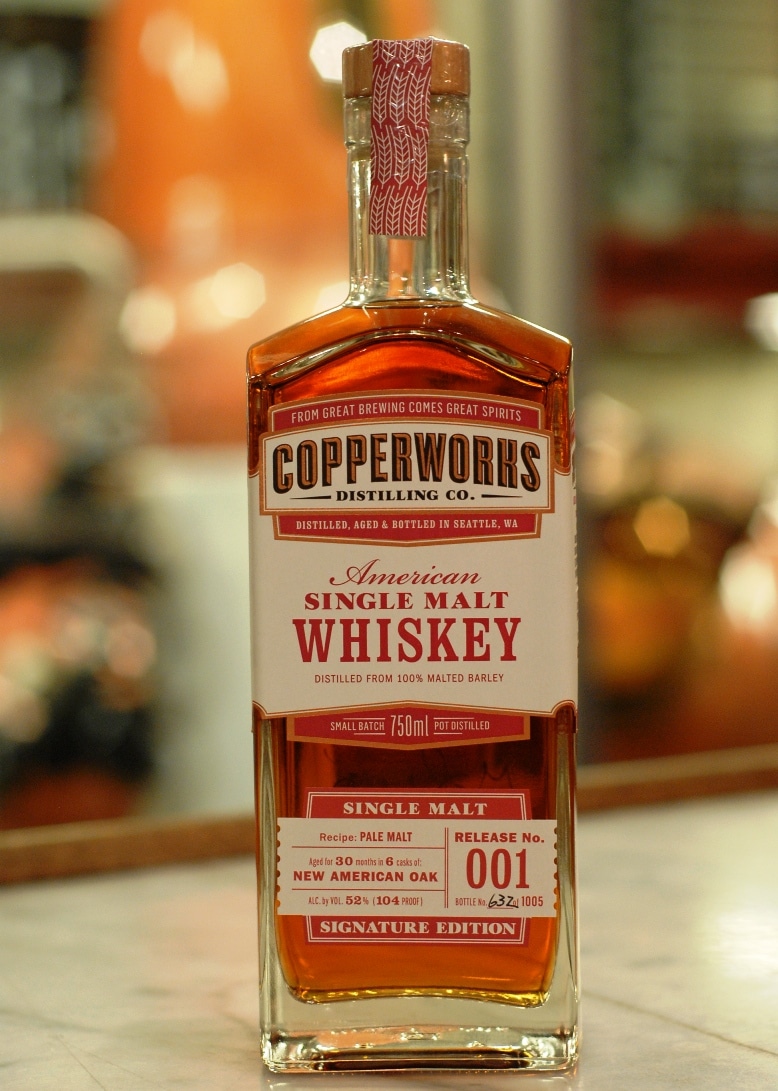
Then, on a joyous August 27, 2016, the day arrived when Copperworks released their first American Single Malt Whiskey.
During my next trek to Seattle, I got to experience this unique sensation. And fortunately for my taste buds, their inaugural release proved to be on par with some of my favorite Scotch whiskeys.
At last count, they were selling their 10th release, with future releases waiting their turn in the barrel.
My taste buds whetted, as I gave myself a mission:
To explore what made this whiskey work so well.
A tour of their distilling operations taught me the specifics of malt selection, brewing, fermenting, distilling and barrel aging processes; however, my goal was to really dive in and ascertain what gave each release its unique signature flavor.
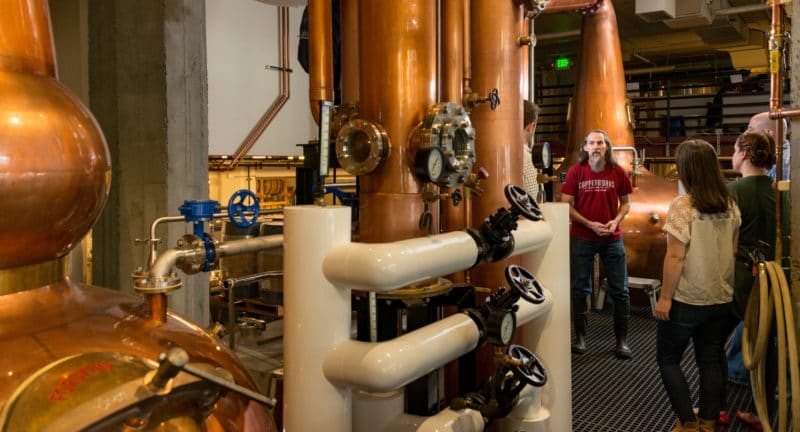
Why did each one of Copperworks Single Malt American Whiskey releases possess such a different taste?
Granted every sip satisfied my palate; but why did one release taste creamier, while another release was a more crisp and dry?
Savoring Spirits At A Whiskey Blending Workshop
In my quest to answer this question, I enrolled in Copperworks’ Whiskey Blending Workshop.
Surrounded by their copper stills, I joined 19 others at folding tables and chairs set up in their distillery.
We gathered for a three-hour session to learn exactly how Copperworks blends a particular release of their American Single Malt Whiskey.
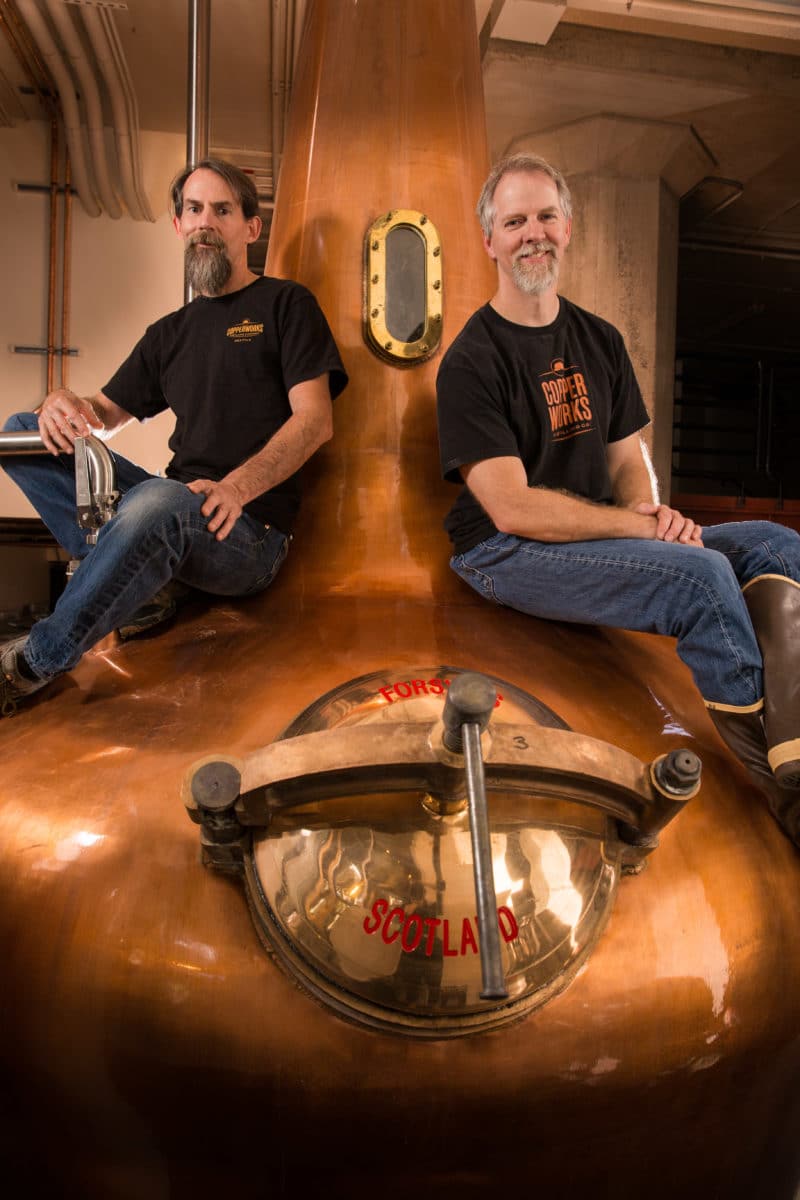
Led by Parker and his co-founder, Micah Nutt, we tasted whiskey from four different barrels. Each barrel used in this workshop had a different oak, toast, or char that gave it a distinct taste.
For instance, two of the barrels contained whiskey made entirely from pale malt, while the other two contained whiskey made from their five-malt recipe.
After sampling whiskey from each barrel, we then decided which flavors most appealed to our palates. In fact, we even used worksheets to determine which percentage of whiskey from our favorite barrels we wanted to combine to create an American Single Malt whiskey that pleased us the most.
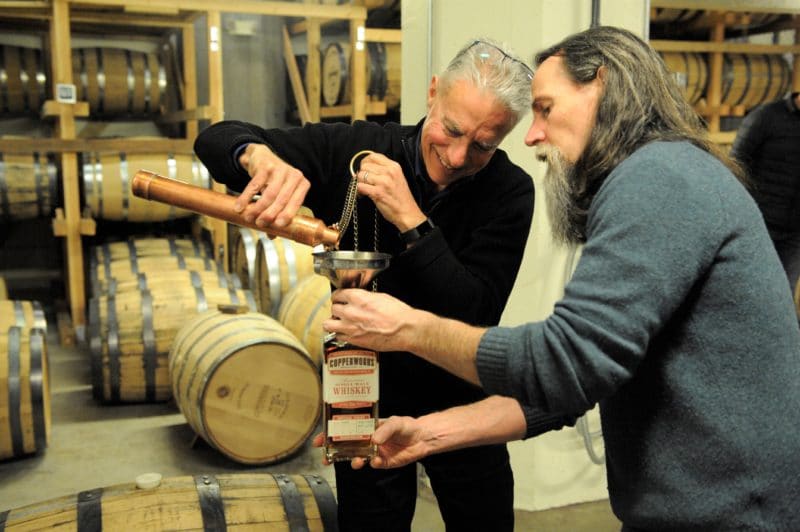
Armed like tipsy scientists with our palate-pleasing data, we stood in line until each of us got the chance to pull whiskey from the barrels, according to the percentages from each barrel that we selected. This simple process involved dropping a metal tube into the barrel and capturing the amount of whiskey needed for one’s blend.
Finally, we hand-corked and labeled our bottles to take home and savor the fruits of our labor.
While sipping my own creation, I understood why Copperworks received the distinction of being named 2018 Distillery of the year by the American Distilling Institute.
The Unique Attributes of Pacific Northwest Whiskey
Now, a question still remained:
What is it about the Pacific Northwest that allows it to represent such a unique place for producing such a fine spirit?
According to Parker, Scotland and Washington State’s Skagit Valley represent two of the few places in the world that have the ideal conditions for growing winter crops — as in, barley, for malting — used in making whiskey.
He also had an interesting observation:
Both are similar in terms of temperature and rainfall, though there a major difference in soil quality.
“Scottish barley is grown in rocky soil with about eight inches of top soil, while Washington’s Skagit Valley has about eight feet,” he explains. “And some of the worst diseases affecting Scottish malt are not present in the Skagit Valley, meaning the crops grow better, and require less sprays to keep them healthy.”
American Whiskey Made From…Beer?
Now, both Nutt and Parker came to this venture as beer brewers. Parker continues:
“We were both interested in what it would taste like if whiskey were made from a high-quality, crafted beer, rather than the traditional “quick-and-dirty” wash that is traditionally produced in Scotland, Kentucky, or the rest of the world, for that matter.”
They learned about the concept of American Single Malt Whiskey — though it wasn’t called that — after tasting Stranahan’s Colorado Whiskey, which Parker had included in one of the occasional whiskey tastings he hosted.
Based on this tasting, they decided whiskey made from beer was the future for American whiskey, and they were going to produce it.
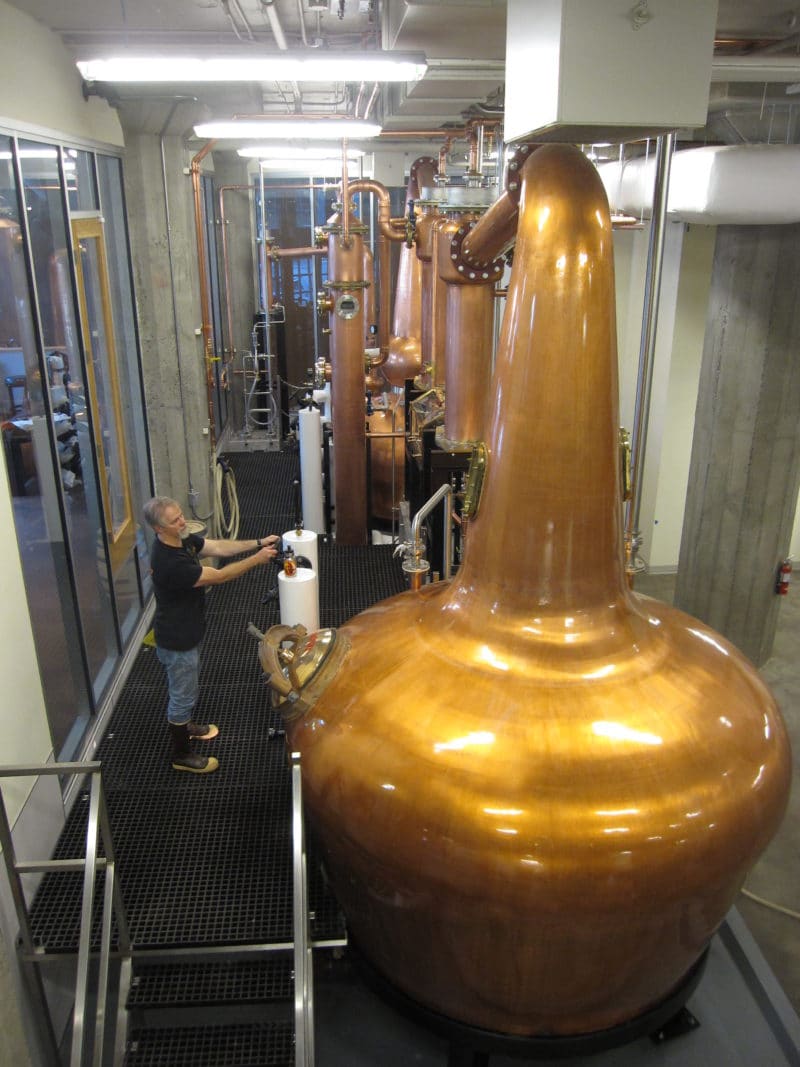
Their distilling process follows hundreds of years of Scottish tradition.
As the Scottish use two copper pots to do their whiskey distillation, they went to Scotland and had their whiskey stills — along with their vodka and gin stills — custom fabricated by Forsyths, who in their estimation are the best of the copper pot manufacturers in Scotland.
Where Copperworks deviates from tradition is by putting 100% malt beers — rather than a “wash” — in the stills, and then distilling the alcohol out.
Also, unlike most other distillers, they use brewers yeast, not distillers yeast.
By the way:
As they are a small operation, they brew their malt beers at three local breweries: Pike Brewing, Elysian Brewing, and Fremont Brewing.
Those familiar with a brewery tour will note everything they do during production is exactly like what you’d find at a craft brewery, except they don’t add hops.
Continued Exploration Of Pacific Northwest Whiskeys
Those visiting Seattle who wish to continue their exploration of Pacific Single Malt American Whiskey should venture over to Westland Distillery, located only three miles south of Copperworks.
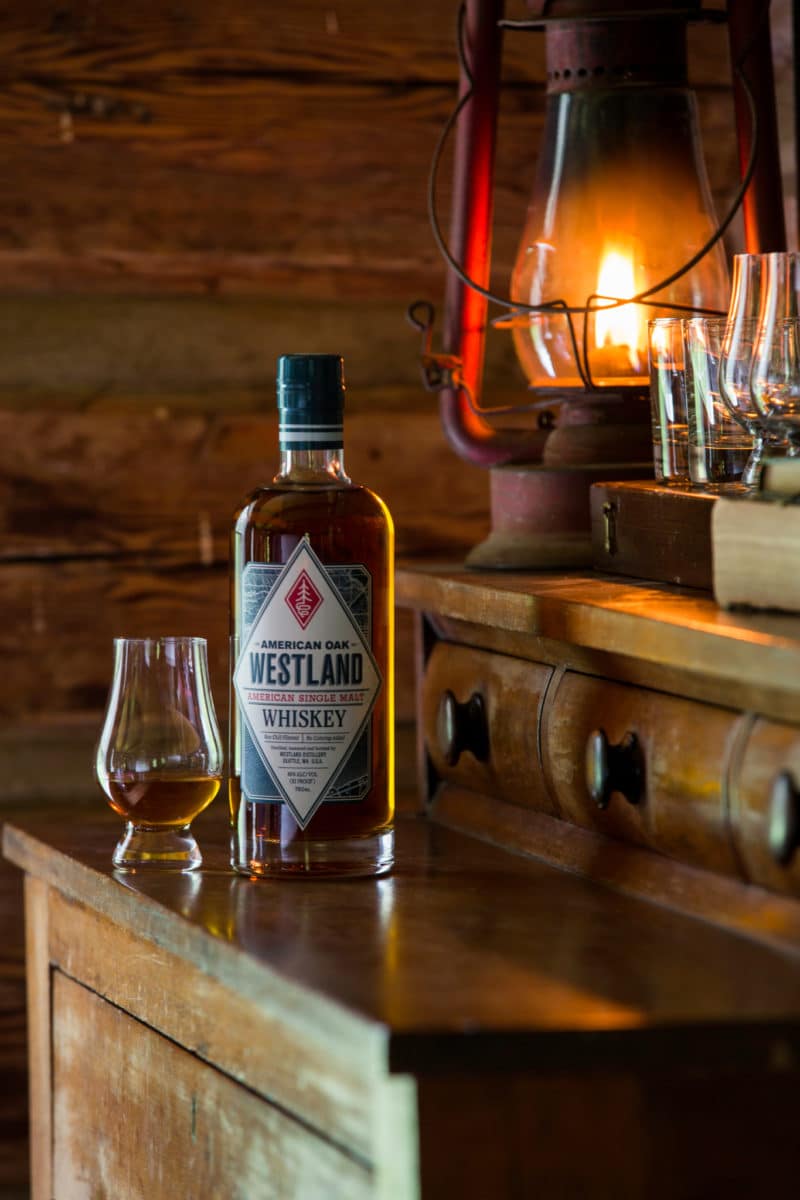
Here’s one great reason why:
Their award-winning American Single Malt Whiskeys have a very different flavor though they are equally delicious.
Additional Pacific Northwest distilleries that produce and release American Single Malt Whiskey on a regular basis include a trio of Portland based distilleries
House Spirits Distillery: With the national release of Westward American Single Malt Whiskey in 2017, House Spirits founder Christian Krogstad fulfilled his lifelong pursuit to create a malt whiskey that embodies the spirit of the Pacific Northwest’s pioneering craft tradition.
Their tasting room, with its oversized windows, allows visitors to observe the distilling process while sampling a tasting flight or a specialty cocktail.
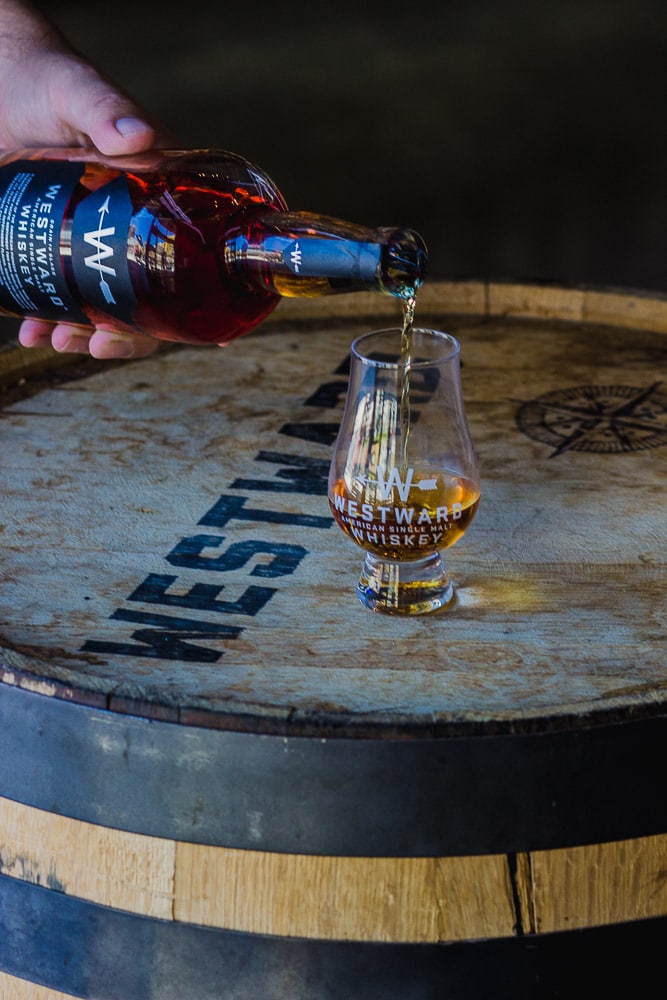
Bull Run Distilling Company: Last year Bull Run started its Oregon Whiskey Hour program where they took over bars in town for a happy hour focusing on showcasing their Oregon Single Malt Whiskey.
This year they intend on bringing the program back, while also including other local malt whiskies to celebrate the growth and variety of the style.
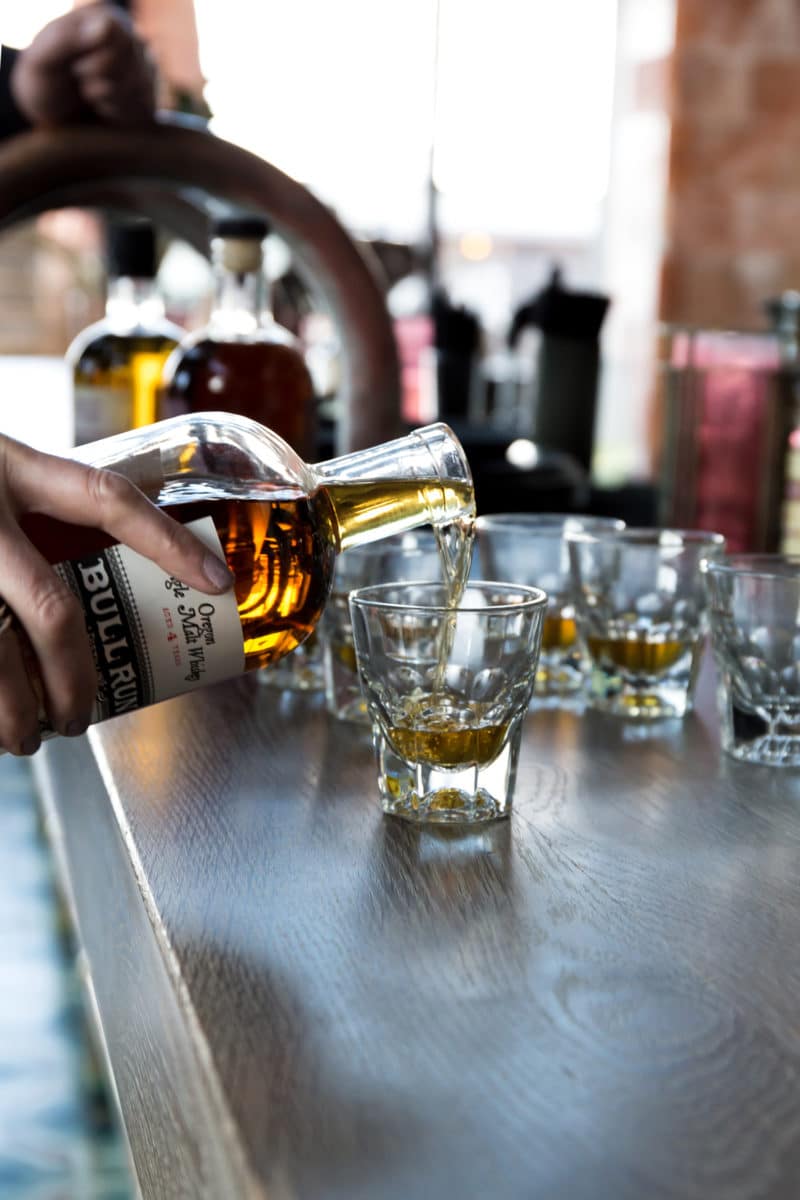
Rouges Ales: In addition to distilling spirits, they also brew beer and operate public meeting halls in OR, WA, and CA.
Among the other area distilleries that make the occasional American Single Malt Whiskey are:
- Admirality Distillers (Port Townsend, WA)
- Big Bottom Distilling (Hillsboro, OR)
- Black Heron Spirits (West Richland, WA)
- Scratch Distilling (Everett, WA)
- Solar Spirits Distillery (Richland, WA)
- Sound Spirits Distillery (Seattle, WA)
- XO Alambic (Dayton, WA)
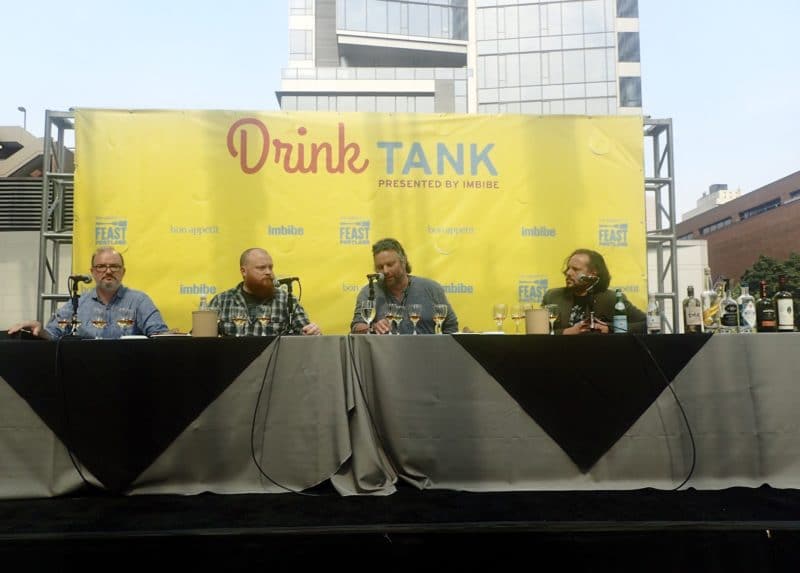
As evidence of the growing popularity of Pacific Northwest American Single Malt Whiskey, Matt Hofmann of Westland Distillery and Christian Krogstad of House Spirits Distillery spoke at a Drink Tank panel with the cheeky title “Kilts Not Required American Single Malt” during Feast Portland 2017.
Additionally, festivals such as Proof and Toast — run by the Washington and Oregon Distillers Guilds respectively — feature ample opportunities to sample a range of spirits including American Single Malt Whiskeys.
All of the above festivals are worth placing a Pacific Northwest trip around.
On that note, what are your favorite distilleries in Washington and the Pacific Northwest for American Single Malt Whiskeys? Please share in the comments below!
Enjoyed this post? Pin it for later!
Becky Garrison
Latest posts by Becky Garrison (see all)
- This Is What Happens When You Seek Out The Best Distilleries In Washington - May 22, 2018
- How To Make A Positive Impact Through Hostelling In The USA - Jan 10, 2018
- An Inside Look At The Pacific Northwest’s Sustainable Cider Movement - May 8, 2017
- 7 Pioneering Chefs Eradicating Hunger In The USA - Apr 11, 2017
- How One Man Revolutionized The Beer Industry For The Better - Nov 10, 2016

